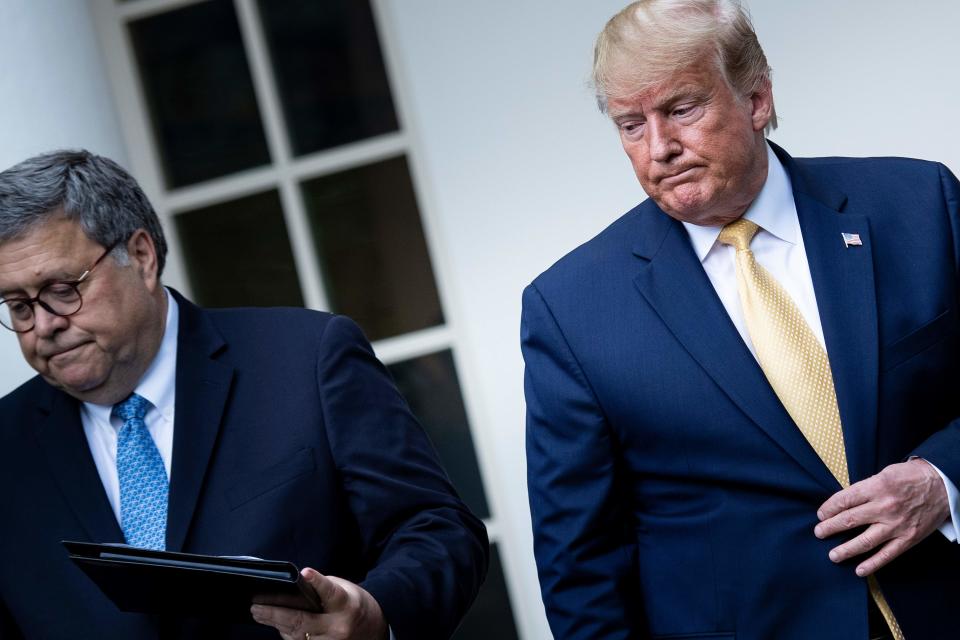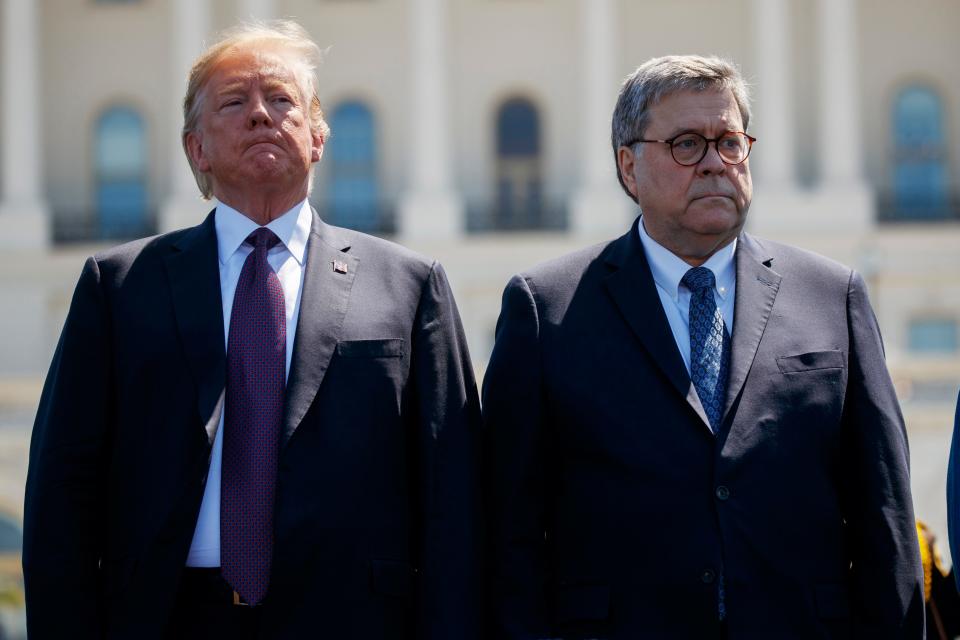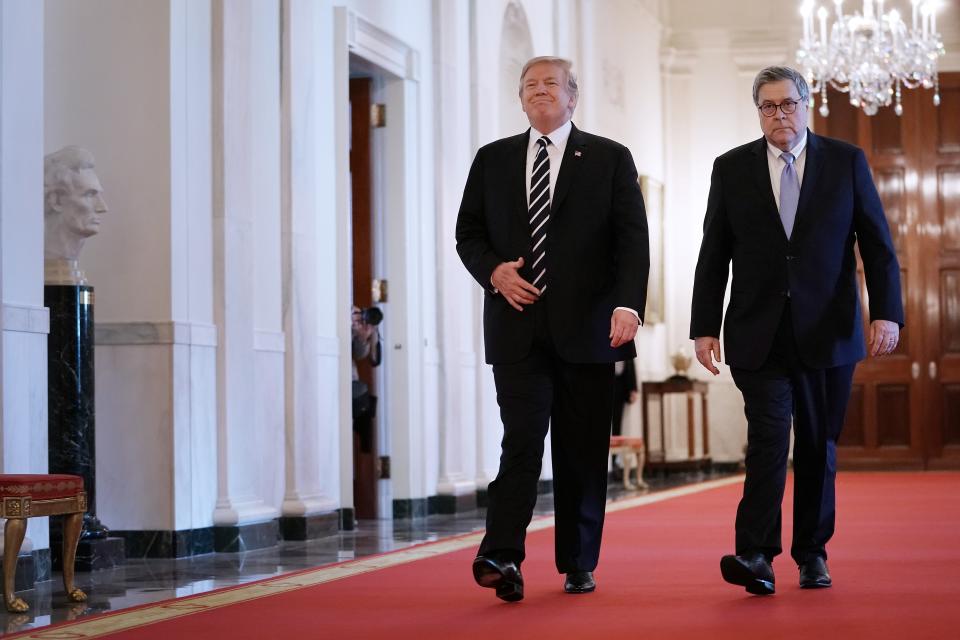Bill Barr's complicated relationship with Donald Trump: From vital advocate to damning witness
- Oops!Something went wrong.Please try again later.
- Oops!Something went wrong.Please try again later.
WASHINGTON – Just more than a month after the 2020 election, Bill Barr recalled a meeting with Donald Trump in which the then-attorney general began to question the state of mind of his boss – the president of the United States.
Over and over, Barr recently told a House committee investigating the Jan. 6, 2021, attack on the U.S. Capitol, he tried to convince Trump that his efforts to cling to power based on false claims of election fraud were “nonsense.”
“I was somewhat demoralized because I thought that 'Boy, if he really believes this stuff he has, you know, lost contact with, become detached from reality,'” Barr told the congressional panel.
The testimony, delivered in a matter-of-fact videotaped deposition and revealed during Monday’s public committee hearing, was stunning enough. But like most of those drawn into Trump’s closest orbit, Barr’s dramatic account did not include the whole story.
Bill Barr emerges as key witness at Jan. 6 hearing: Barr told Trump his fraud claims were 'bull----.' Former AG emerges as key witness at Jan. 6 hearing
What happened at Monday's Jan. 6 hearing: Trump ignored aides and evidence he lost, panel says he ripped off donors: Jan. 6 hearing takeaways
In an effusive resignation letter, dated the same day of the attorney general’s White House meeting – Dec. 14, 2020 – Barr lauded the president’s tenure as “historic” whose achievements were “accomplished in the face of relentless, implacable resistance.”
The six-paragraph letter stands as a head-scratching counterpoint to the damning image Barr outlined Monday for the committee where Barr has emerged as one of the panel’s most powerful witnesses. The compelling narrative offered up by a consummate Trump insider made it all the more forceful. Yet Barr’s repudiation also highlighted the former attorney general’s prior role as an indispensable advocate for some of Trump’s most extreme public assertions, from suggesting that the FBI had “spied” on the former president’s campaign to denouncing the Russia investigation as an attempt at political sabotage.

“Of all of the (committee’s) witnesses, Barr may have been the most important one by his repeated statements to Trump in November and December, saying there was no voter fraud,” said Donald Ayer, a former deputy attorney general in the George H.W. Bush administration. “None of this changes the fact that as attorney general he repeatedly used his official authority for improper political reasons, including doing favors for Trump’s friends and misusing (the Justice Department’s) investigative powers to aid Trump’s electoral prospects.
"So the credit he is due for standing up to Trump’s efforts to steal the election by false claims of fraud has to be considered in that light.”
Miss Day 2 of the Jan. 6 hearings?: Bill Barr returns, election lies debunked and more
Barr backs Trump, says he thinks 'spying did occur' on president
Following the tumult that defined Jeff Sessions' tenure as Trump's first attorney general, Barr's arrival at the Justice Department was viewed as an opportunity for a long-needed re-set.
It didn't last.
Two months into the job, Barr made a startling pronouncement: telling a Senate committee that he was reviewing whether federal authorities improperly monitored Trump's campaign during the early states of the federal investigation into Russian efforts to sway the 2016 election.
"Spying on a campaign is a big deal," Barr told lawmakers then. "I think spying did occur. The question is whether it was adequately predicated."
Barr and 'spying': Attorney general says he will review government 'spying' on Trump campaign; 'I am concerned'
The attorney general's statements, a prelude to his appointment of a special prosecutor to investigate the origins of the Russia inquiry, echoed one of the president's most incendiary rallying cries, asserting that Trump Tower had been targeted for surveillance by the Obama administration.
While the Justice Department's inspector general later found that the surveillance of a former Trump aide was improper, the watchdog concluded that the FBI was justified in launching its Russian interference inquiry and determined there was "no evidence" the FBI placed undercover sources or agents in the Trump campaign or had them attend campaign events.
Mueller report: Mueller’s report found no Russia collusion, but vindication remains elusive for Trump
Days after his appearance before the Senate panel, Barr was front and center at the Justice Department where he offered a stirring defense of the president in the face of special counsel Robert Mueller's searing account of Trump's conduct during the Russia investigation.
"President Trump faced an unprecedented situation," Barr said then. "As he entered into office, and sought to perform his responsibilities as president, federal agents and prosecutors were scrutinizing his conduct before and after taking office, and the conduct of some of his associates. At the same time, there was relentless speculation in the news media about the president’s personal culpability."
For Barr's work to "land the plane" that then represented the most serious threat to his presidency, Trump offered public thanks to his attorney general.
"He's an outstanding man, he's an outstanding legal mind," Trump said after Barr defended his handling of the Russia investigation during a combative Senate hearing. "He performed incredibly well today."
When is the next Jan. 6 hearing?: Jan. 6 committee hearing schedule: Here's what we know about the upcoming Jan. 6 hearings
Barr doubled-down on his defense of Trump in November 2019, delivering a bitingly-partisan address to the conservative Federalist Society.
“The pursuit of scores of investigations and an avalanche of subpoenas is meant to incapacitate” the administration, Barr said. “I am convinced that the deck has been stacked against the executive.”

Barr, like Trump, expressed concern about 'floodgates of potential fraud' with mail-in ballots
In the run-up to the 2020 election, Barr, again, was sounding a lot like his boss.
The attorney general, in a June interview with Fox News, raised the prospect that mail-in ballots were highly susceptible to fraud, expressing serious concern "for the integrity of the election."
"When governments – state governments – start adopting these practices like mail-in ballots that open the floodgates of potential fraud, then people's confidence in the outcome of the election is going to be undermined and that could take the country to a very dark place if we lose confidence in the outcome of our elections," he said then.
Three months later, in a CNN interview, Barr said a reliance on mail-in ballots was akin to "playing with fire," adding that system was "open to fraud and coercion."
Barr appeared to put the Justice Department in the center of another political firestorm following the election when, in a break with long-standing policy, he issued a memo authorizing federal prosecutors to pursue allegations of voting irregularities before the election was certified.
Who has been arrested in Jan. 6 investigation?: Who has been arrested in the Jan. 6 Capitol riot, by the numbers
The attorney general said the policy, which triggered the resignation of the department's election crimes chief, should only be exercised "if there are clear and apparently-credible allegations of irregularities that, if true, could potentially impact the outcome of a federal election in an individual state."
At the time, a Justice official said Trump had not directed Barr to take the action. But the timing of the memo drew nearly as much notice as its contents, with Trump's legal team failing in their efforts to contest voting in several key states.
Among those who strongly denounced the move was Sen. Amy Klobuchar, D-Minn., a member of the Judiciary Committee, who then called Barr’s directive “disheartening,'' adding that it fed a false narrative that “something is wrong with this election.”
Why is Pence central to Jan. 6 investigation?: Pence is central in Jan. 6 investigation as 'constitutional patriot' who defied Trump, became mob target
Barr does an about face once Trump took fraud claims too far
For Barr, according to portions of his deposition made public Monday, the point of no return came in late November 2020. The former attorney general described a Fox News interview in which Trump then suggested that federal authorities were ignoring baseless claims of massive election fraud in Michigan and Pennsylvania, even after the attorney general had told Trump there was so such evidence.
"This got under my skin," Barr told House investigators. "But I also felt it was time for me to say something."
And he did.
In a Dec. 1, 2020 interview with the Associated Press, published just before a late afternoon appointment at the White House, Barr said Justice had no evidence of widespread voter fraud that would change the outcome of the vote.
Barr's comments represented an especially public retreat from Trump’s repeated claims of voter fraud and resounded across Washington, especially at the White House, like a thunder clap.
“To date, we have not seen fraud on a scale that could have affected a different outcome in the election,” Barr told the AP.
The Jan. 6 committee has subpoenaed nearly 100 witnesses: What does that mean?

Hours later, Barr told investigators, he was in the Oval Office facing the president who was "as mad as I've ever seen him and he was trying to control himself."
"You didn't have to say this," Barr recounted the president as saying. "You must have said this because you hate Trump. You hate Trump..."
Barr would go on to testify how he held nothing back from Trump during that tense meeting and his last on Dec. 14, repeatedly describing the president's voter fraud claims as "bull--."
He described Trump's allegations that voting machines had been corrupted as "idiotic."
"And I told them it was crazy stuff...and it was doing a great, grave disservice to the country," Barr told investigators.
Barr also appeared to dismantle any possible defense that Trump might raise, including that he was not sufficiently briefed that the claims he pursued were baseless.
Jan. 6 committee kicks off hearing in prime-time: A 'sophisticated' 7-part plan. 'Slipping in people's blood': Takeaways from prime-time Jan. 6 hearing

"There was never an indication of interest in what the actual facts were," Barr said. "And in my opinion then and my opinion now is that the election was not stolen by fraud and I haven't seen anything since the election that changes my mind."
The damning nature of Barr's testimony immediately cast him as one of the House committee's most compelling witnesses during the first two public hearings.
Bruce Udolf, a former federal prosecutor who served as an associate independent counsel in the Clinton Whitewater investigation, acknowledged the importance of Barr’s testimony but urged that it should not obscure the role the former attorney general played as Trump’s defender.
“He doesn’t get a profile in courage award just because it was the right side to be on,” Udolf said.
Tears, tissues, T-shirts: What it was like in the room during the Jan. 6 committee hearing
This article originally appeared on USA TODAY: Barr's Jan 6 testimony highlights complicated relationship with Trump

